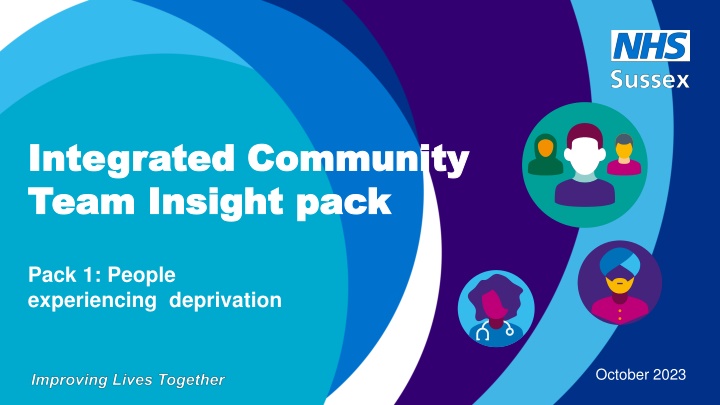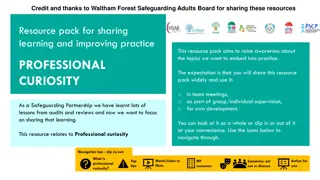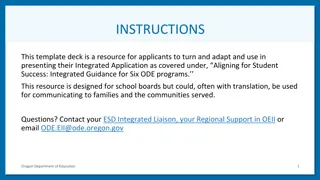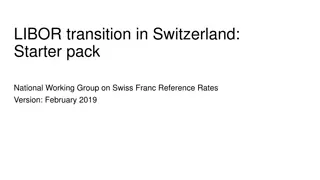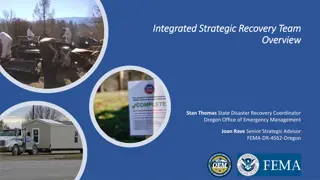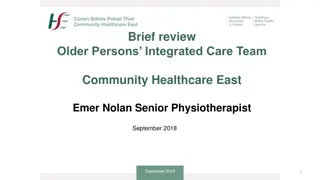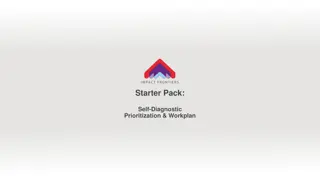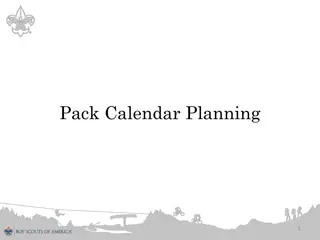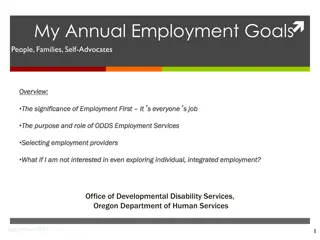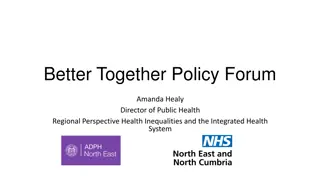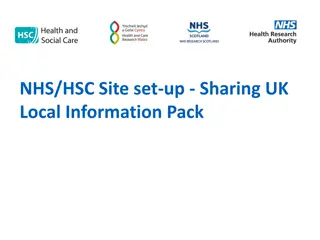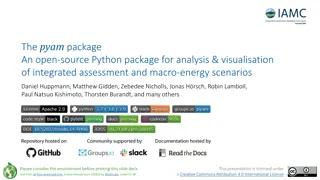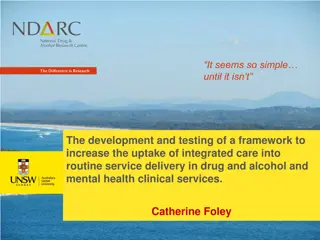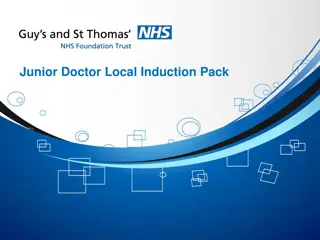Integrated Community Team Insight pack
This Insight Pack aims to support ICTs in accessing key community insights related to health inequalities in Sussex communities experiencing deprivation. It emphasizes the significance of local insight, community engagement, and utilizing data to enhance services and reduce health disparities.
Download Presentation

Please find below an Image/Link to download the presentation.
The content on the website is provided AS IS for your information and personal use only. It may not be sold, licensed, or shared on other websites without obtaining consent from the author.If you encounter any issues during the download, it is possible that the publisher has removed the file from their server.
You are allowed to download the files provided on this website for personal or commercial use, subject to the condition that they are used lawfully. All files are the property of their respective owners.
The content on the website is provided AS IS for your information and personal use only. It may not be sold, licensed, or shared on other websites without obtaining consent from the author.
E N D
Presentation Transcript
Integrated Community Integrated Community Team Insight pack Team Insight pack Pack 1: People experiencing deprivation October 2023
Insight Packs Insight Packs general narrative general narrative This is Pack 1 of a series of insight packs produced to support ICTs to access key community insight that already exists. Insight packs draw on available insight related to a particular health inequality, protected characteristic or inclusion group. Insight is drawn from the Sussex Insight Bank and other key local and national sources. It reflects a point in time: insight is captured constantly. This pack is not intended to be a comprehensive resource, but a way to understand known issues about these communities to inform your ICT development. Remember intersectionality: people and communities may have a number of characteristics, for example, be an older person with physical disabilities, living in a rural area.
Using insight packs Using insight packs We are not all the same: Our communities consist of people with different needs, experiences and barriers to health Local people are valuable assets: they often have insight that can inform change and improvement, as well as suggestions/solutions Local insight can help inform and transform services, saving time and money and improving outcomes Focusing on insight from communities with poorer outcomes can help reduce health inequalities There is a need to listen to our communities, and show that their views influence change and improvement
Using your insight pack Using your insight pack 1. Decide which insight packs from the series are most relevant for your ICT (informed by both the data profiles and communities which will be common to all ICTs) 2. Identify key gaps in insight: contact the Involvement team if advice is needed on addressing gaps 3. Draw together your insight to create a what we know about our community picture 4. Ask your community if they recognise the data and insight, and ask what they feel is missing 5. Create community conversations through your Community Panel, together with ICT partners, to use insight to drive ICT design and service improvement 6. Use your insight as a checklist which changes and developments have worked? Have issues been responded to? How are communities seeing change and improvement?
Pack 1: People experiencing deprivation Pack 1: People experiencing deprivation Even the most affluent communities in Sussex will contain people living in deprivation Surroundings Transport Housing For this group, many of the building blocks that are essential to physical and mental health (see right) are compromised Family, friends and communities This insight pack summarises some of the insight from local communities experiencing deprivation held on the Sussex Insight Bank and from other sources. Work Food Education and skills
Summary Summary Financial hardship compounds existing physical and mental health problems and is a key cause of anxiety There are specific problems accessing services, including the 8am dash for GP appointments, digital access and issues related to cost of travel for face-to-face appointments The above can lead to greater use of A&E Community navigator and community champion roles are valued and provide signposting and information from a position of trust and confidence
Financial hardship is a key cause of anxiety, Financial hardship is a key cause of anxiety, and compounds health problems and compounds health problems People with lived experience of financial struggle shared stories, recounting the effects of rising costs, insecure housing, complex benefits systems etc., on their health I do have mental health conditions which have been exacerbated by the financial climate. There is constant stress & worry, will I fall too far behind on my rent & become homeless? How will I ever pay off my debts? Can I top up the electric meter this week? What happens if I get ill & how on earth am I going to manage as I get older? The worry is constant Findings: Financial hardship plus illness and caring responsibilities have a cascade effect on health which is compounded when people can t access healthcare Unexpected expenses often leave people unable to afford the basics and they struggle to cope This compounds physical and mental health problems and leads to anxiety, insecurity and fear within individuals and communities
The difficulties of accessing GP care The difficulties of accessing GP care The 8am dash for a same day appointment is particularly difficult for people who are travelling to work, or already at work at this time have little control at work or flexibility to make and receive calls don t have mobile phones or mobile phone credit There is a demand for evening/weekend appointments but these are often not available Parental responsibilities make it difficult to contact the practice when it opens in the morning by the time people can make a phone call, appointments have gone Those with children and/or single parents may find it challenging to access appointments due to a lack of childcare Lack of space and privacy at home or at work can make it difficult to have conversations - even with GP receptionists - and impossible to have telephone or online appointments When people find it difficult to get a GP appointment they may go to A&E, or they may ignore their problems, which may then become worse I am so unmotivated, so I end up leaving things until they are really bad ad harder to treat and become an emergency
Additional access problems Additional access problems The cost of travelling to NHS appointments - especially regular appointment - as well as to Walk in Centres and MIUs can be prohibitive People aren t always aware of alternatives such as MIUs, and the extended services pharmacies may offer Work and family commitments make it difficult for people to attend daytime appointments: they may rely on other people for transport to get them there and these people may also have commitments Attending an appointment can take a long time, especially when clinics often run late or there is a lot of travel involved: this often means people need to book time off work and the subsequent loss of income may mean they can t afford it Shorter appointments could be offered remotely Remote consultations suit some people but can be difficult for others, such as those on a low income, those without data and those who lack digital skills Opening at least one weekend a month would help
Accessing support and signposting is key Accessing support and signposting is key Local advice services, social prescribers, community champions and other community navigator roles are particularly valuable for those struggling financially including those experiencing deprivation These services help those who are struggling to navigate different systems including the benefits and healthcare systems They can increase knowledge of available services and support, and can also increase awareness of preventative activity Availability of these services is not equitable across areas Some people are put off from approaching statutory services or other support for help (e.g. with food) due to perceptions that their children will be taken from them if they are seen not to be coping
Sources Sources Feeling the pinch: Unique insights & ideas from lived experience of the cost-of-living crisis (2023) Lewes District Food Partnership Connecting People and Places (2023) Annual Report of the Director of Public Health, East Sussex Let s talk about your experiences of NHS Care in Sussex: Analysis of Insight (July 2023) NHS Sussex, Reports from Community Connector projects in Hastings (2023) Reports from Universal Healthcare Hastings project (2023) Winter Access Fund Project (2022) Voluntary Action Arun and Chichester (VAAC) Winter Access Fund Project - East Brighton (2022) Trust for Developing Communities Winter Access Fund Project - Havens and Rye (2022) Possability People Healthwatch in Sussex Insight Health and Care Pressures (2021) Healthwatch For reference: Sussex Insight Bank
